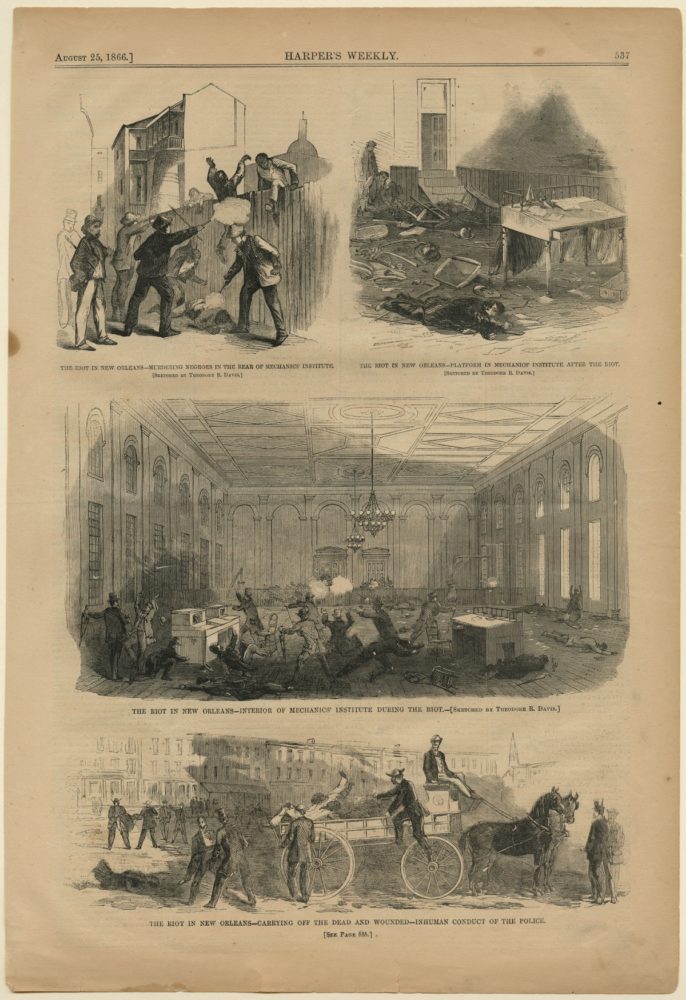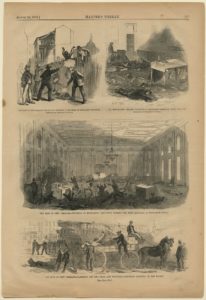Historic New Orleans Collection
Discovering the Lost 1866 Issues of the New Orleans Tribune
The issues provided honest coverage of the Mechanics’ Institute Massacre of July 30, 1866
Published: December 3, 2018
Last Updated: March 1, 2019

The Historic New Orleans Collection, 1979.200 i–iv
Detail from The Riot in New Orleans by Theodore Russell Davis. Harper’s Weekly, Aug. 25, 1866.
One such event was the pivotal and tragic Mechanics’ Institute Massacre of July 30, 1866, when some forty advocates of black suffrage were murdered in New Orleans by racist reactionaries, including police officers. Frustratingly, the issues of the Tribune from the days surrounding the massacre were believed to be lost—until now.
While preparing my forthcoming book for The Historic New Orleans Collection (THNOC), Afro-Creole Poetry in French from Louisiana’s Radical Civil War–Era Newspapers: A Bilingual Edition, I located several of the “missing” issues from July and August 1866 at the American Antiquarian Society (AAS), a research center and learned society in Worcester, Massachusetts.
Founded in 1812, the AAS holds over three million documents and objects related to the history of the United States and the Americas. Nearly twenty years ago, I visited the center as a research assistant to Dana Kress, professor at Centenary College of Louisiana. Kress and I spent a week combing through the AAS’s mammoth collection of Louisiana French imprints and manuscripts donated by Edward Larocque Tinker (1881–1968).
I distinctly remember, after asking to view the folders containing issues of the Tribune, the staff’s apologizing for the small quantity and poor condition of their offerings. Little did they or I know, as I flipped hastily through them, the worth of those folders’ fragile contents.
In the summer of 2016, while I worked on my book for THNOC, the 150th anniversary of the Mechanics’ Institute Massacre weighed heavily on my mind. I wished more than ever for the Tribune’s account. One afternoon, I recalled my first trip to the AAS. It occurred to me that those folders might contain some of the “lost” issues of the Tribune.
They do. Several weeks later, breathless with anticipation, I traveled to Massachusetts to view them.
The Tribune’s articles provide a gripping account of those tumultuous days from the summer of 1866, as the paper worked hard to prevent the racist press from controlling the narrative. One piece in French, “Notes to Serve in the History of the New Orleans Massacre,” opens thus (my translation): “While the rebel newspapers were requesting, with great cries, that their representatives be admitted to Congress, we, the Unionists, were being attacked by them in our most sacred rights—the rights that we possess to gather in public. When liberty of discussion no longer exists, all liberties of the citizen are in danger.”
THNOC, the AAS, and other institutions devote themselves to preserving the many voices in the discussion as it evolves over time and, in so doing, help to preserve those sacred rights and liberties championed in the Tribune. The chance to reintroduce this key nineteenth-century source to accounts of the Mechanics’ Institute Massacre and its place in the history of race and rights in the United States is a privilege and a thrill.
Clint Bruce is assistant professor at Université Sainte-Anne, in Nova Scotia, where he holds the Canada Research Chair in Acadian and Transnational Studies. His discovery of the lost issues of the Tribune will feature in his forthcoming book from THNOC (Afro-Creole Poetry in French from Louisiana’s Radical Civil War–Era Newspapers: A Bilingual Edition) and in a scholarly essay: “‘Notes to Serve in the History of the New Orleans Massacre’: The (Heretofore Unknown) Stance of the New Orleans Tribune in the Wake of the Mechanics’ Institute Massacre of 1866.”

